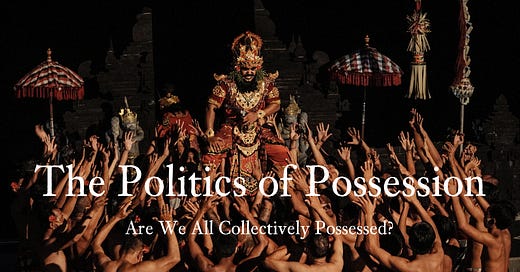I don’t need to tell you that we’re living in divided times.
Odds are, you’ve lost a few people from your life during the dystopian fever dream of the last five years. Perhaps you’ve noticed that people, on the whole, have changed. Walking into a coffee shop or neighborhood co-op or bookstore is not met with a welcoming smile or momentary connection, but with an atmosphere of quiet defense. All of us are armed to the teeth with our hardened facts, our calcified ideologies, our coded turns of phrase, fearing that we’ll be eaten alive by our respective subcultural milieu.
This isn’t just because we’re living in a fraught political environment, because of late-stage capitalism, or because our culture is fracturing like the northern ice-sheets. All of this is true, and yet perhaps symptoms of something occurring on an even deeper psychological and psycho-spiritual level:
We are living through a time of collective possession.
Whether it's the constant, dopamine-fueled trance of social media, or the shockingly pervasive use of medically-sanctioned psychotropic drugs, or simply people's own rigid ideologies and fears feeding on the current outrage du-jour, the fact remains: we are a society buckling under the weight of our possessions.
I’ve written about this before, both in my book and in previous Substack articles, specifically in the context of psychedelic leadership, and how people wield the power of that role consciously or unconsciously.
But this is a different article, for a different purpose, in a different time.
Today, we are stepping into an era where the idea of possession, especially when understood through an archetypal and animistic lens, can help us understand our current circumstances.
For those of us in the modern West, possession as a psychological and cultural fact deserves to be acknowledged with the same legitimacy that it is in virtually every culture but our own. If we cannot begin to understand the notion of possession as a real and psychological threat that we all face, then we run the risk of being victims to it.
Because, after all, the Devil’s greatest trick was convincing us he wasn’t real.
Before I go any further, let’s unpack this phenomenon of possession.
According to Jung, archetypal possession occurs when the archetype unconsciously “seizes hold of the psyche with a kind of primeval force and compels it to transgress the bounds of humanity. The consequence is a puffed-up attitude (inflation), loss of free will, delusion and enthusiasm for good and evil alike. This is the reason why men have always needed demons and cannot live without gods (1972, pp. 70–71).”
We don’t have to look hard to find examples of this playing out across the world stage today, and throughout history.
From a more animistic, or anthropological lens, Graham Harvey describes possession as a way that “other-than-human” beings make themselves present through humans as their vehicle. People become that which possesses them.





